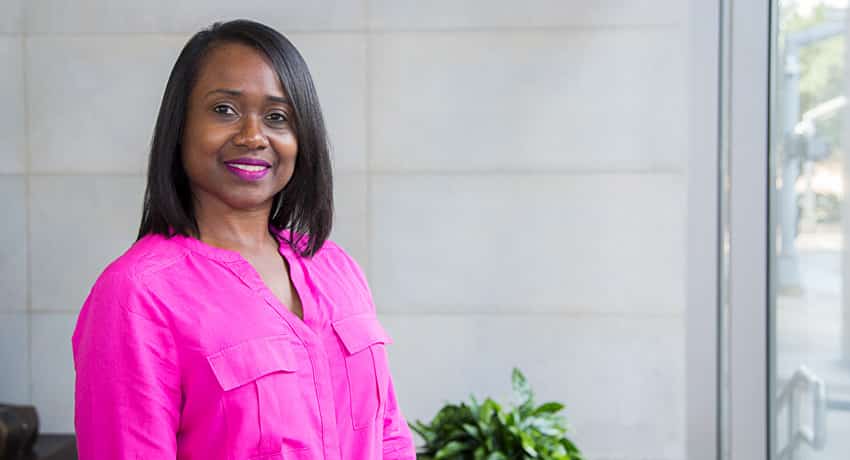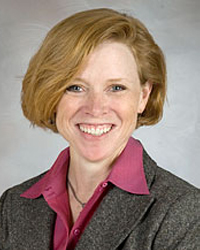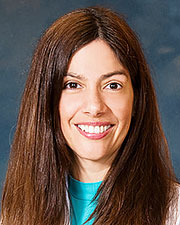Searching for the positive in a sea of uncertainty

One Houstonian shares her breast cancer survival story to raise awareness about the disease. Photo credit: Lorenz Meyer, McGovern Medical School
How one team makes a difference in the lives of many
October and the color pink—it has become a sign of struggle, strength and hope. Breast cancer strikes all races, cultures and genders. The stories of survival are shared to raise awareness about the importance of early detection and proactive health care. One survivor wants you to hear and heed these words: listen to your body.
Carla’s story
Annual exams were always part of Carla Square’s routine. In August of 2013, she completed her mammogram and everything looked clear. The following month, she felt a suspicious lump in her breast.
“I reported it to my physician,” she remembers. “She said since my imaging was clear last month, there was no concern.”
Months later, Carla began to feel a burning sensation in her breast, so she sought out the advice of a colleague in the medical field. Tests were ordered. “She called me and asked me to come into her office to review the results,” says Carla. “In my mind, I felt like I already knew what she was going to say. When I walked into her office, I could simply tell by the look on her face.”
Cancer. One word that for many causes a deep feeling of emotion. There are countless stories—my mother, grandfather, son, cousin, a friend— it all starts with an accelerated division of cells that connects humanity on the same path. That path becomes a journey to beat cancer.
Cancer-fighting team

Emily K. Robinson, MD
“We hear that. Women will say they just want to remove their breast—and sometimes both because of a cancer diagnosis,” says Robinson. “They are stressed and everyone can identify with that. Our goal is to pull all of the specialists together to come up with a treatment plan to attack the cancer. The team includes a medical oncologist, a breast surgeon, radiation oncologists and a breast reconstructive plastic surgeon. Sometimes the best plan for a patient begins with chemotherapy.”
That was the case for Carla. Her fight began with rounds of chemotherapy led by medical oncologist Anneliese O. Gonzalez, MD, at the Memorial Hermann Cancer Center.
“Carla had an excellent response to chemotherapy before surgery,” says Gonzalez, associate professor at McGovern Medical School at UTHealth. “We call this approach neoadjuvant chemotherapy. Carla was always upbeat and maintained a great attitude during the entire treatment.”

Anneliese O. Gonzalez, MD
“In the beginning I cried, I thought why me,” says Carla. “Then after I met with the physicians I realized that I needed to shift my attitude. Your attitude plays a big role in your therapy. I was sad on the inside, but on the outside I had specialists ready to fight with me. They were both awesome. They made me feel like I was their only patient. I felt like that I mattered to them.”
In December of 2014, Square had her right breast removed. With a little laugh, Square says she was dancing with Ned in January of 2015. When asked who Ned is, Carla replies, “Ned stands for no evidence of disease. I got to hear Gonzalez tell me that I am cancer-free.”
“We want the best response,” says Robinson. “Each case is unique and is analyzed. I felt a calling early-on for surgical oncology. You have the opportunity to help people through a very hard time in their life. We are also collecting data and researching—always looking for new ways to attack cancer.”
The statistics are startling for breast cancer. About one in eight U.S. women will develop invasive breast cancer over the course of her lifetime. The most significant risks for breast cancer include being a woman, your age, family history and genetics.
Stay strong and focused
For Carla, she wants to remind everyone to get a second opinion if you think something is wrong—especially if something is suspicious like a lump. “Make sure you get checked and re-checked—you know your body,” says Carla. “Cancer doesn’t have to be a death sentence. Cancer actually taught me to appreciate life more. I travel more. I visit family more. I love more. I was thankful for all my friends and family who rallied around me for support.”
Carla created a blog to help support others whose lives are impacted by a breast cancer diagnosis. This month, she also hosting a 30 day walk challenge in honor of all survivors. She will also be participating in the American Cancer Society’s Making Strides Against Breast Cancer Walk on November 13.
“For all of those out there going through the battle, hold on to your faith, hope and determination,” advises Carla. “Those things make the journey so much easier.”
Written By: Melissa McDonald, UT Physicians | October 11, 2021